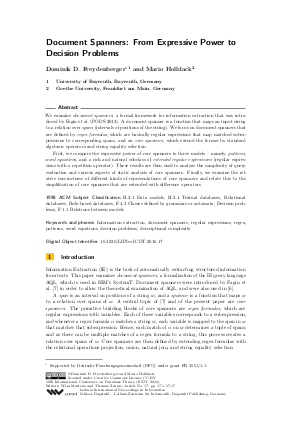Document Spanners: From Expressive Power to Decision Problems
Authors Dominik D. Freydenberger, Mario Holldack
-
Part of:
Volume:
19th International Conference on Database Theory (ICDT 2016)
Part of: Series: Leibniz International Proceedings in Informatics (LIPIcs)
Part of: Conference: International Conference on Database Theory (ICDT) - License:
 Creative Commons Attribution 3.0 Unported license
Creative Commons Attribution 3.0 Unported license
- Publication Date: 2016-03-14
File

PDF
LIPIcs.ICDT.2016.17.pdf
- Filesize: 0.56 MB
- 17 pages
Document Identifiers
Subject Classification
Keywords
- Information extraction
- document spanners
- regular expressions
- regex
- patterns
- word equations
- decision problems
- descriptional complexity
Metrics
- Access Statistics
-
Total Accesses (updated on a weekly basis)
0PDF Downloads0Metadata Views
Abstract
We examine document spanners, a formal framework for information extraction that was introduced by Fagin et al. (PODS 2013). A document spanner is a function that maps an input string to a relation over spans (intervals of positions of the string). We focus on document spanners that are defined by regex formulas, which are basically regular expressions that map matched subexpressions to corresponding spans, and on core spanners, which extend the former by standard algebraic operators and string equality selection. First, we compare the expressive power of core spanners to three models - namely, patterns, word equations, and a rich and natural subclass of extended regular expressions (regular expressions with a repetition operator). These results are then used to analyze the complexity of query evaluation and various aspects of static analysis of core spanners. Finally, we examine the relative succinctness of different kinds of representations of core spanners and relate this to the simplification of core spanners that are extended with difference operators.
Cite As Get BibTex
Dominik D. Freydenberger and Mario Holldack. Document Spanners: From Expressive Power to Decision Problems. In 19th International Conference on Database Theory (ICDT 2016). Leibniz International Proceedings in Informatics (LIPIcs), Volume 48, pp. 17:1-17:17, Schloss Dagstuhl – Leibniz-Zentrum für Informatik (2016)
https://doi.org/10.4230/LIPIcs.ICDT.2016.17
BibTex
@InProceedings{freydenberger_et_al:LIPIcs.ICDT.2016.17,
author = {Freydenberger, Dominik D. and Holldack, Mario},
title = {{Document Spanners: From Expressive Power to Decision Problems}},
booktitle = {19th International Conference on Database Theory (ICDT 2016)},
pages = {17:1--17:17},
series = {Leibniz International Proceedings in Informatics (LIPIcs)},
ISBN = {978-3-95977-002-6},
ISSN = {1868-8969},
year = {2016},
volume = {48},
editor = {Martens, Wim and Zeume, Thomas},
publisher = {Schloss Dagstuhl -- Leibniz-Zentrum f{\"u}r Informatik},
address = {Dagstuhl, Germany},
URL = {https://drops.dagstuhl.de/entities/document/10.4230/LIPIcs.ICDT.2016.17},
URN = {urn:nbn:de:0030-drops-57867},
doi = {10.4230/LIPIcs.ICDT.2016.17},
annote = {Keywords: Information extraction, document spanners, regular expressions, regex, patterns, word equations, decision problems, descriptional complexity}
}
Author Details
References
-
P. Barceló, L. Libkin, A. W. Lin, and P. T. Wood. Expressive languages for path queries over graph-structured data. ACM T. Database Syst., 37(4):31, 2012.

-
P. Barceló and P. Muñoz. Graph logics with rational relations: the role of word combinatorics. In Proc. CSL-LICS 2014, 2014.

-
J. Bremer and D. D. Freydenberger. Inclusion problems for patterns with a bounded number of variables. Inform. Comput., 220-221:15-43, 2012.

-
C. Câmpeanu, K. Salomaa, and S. Yu. A formal study of practical regular expressions. Int. J. Found. Comput. Sci., 14:1007-1018, 2003.

-
V. Diekert. Makanin’s Algorithm. In M. Lothaire, editor, Algebraic Combinatorics on Words, chapter 12, pages 387-442. Cambridge University Press, 2002.

-
R. Fagin, B. Kimelfeld, F. Reiss, and S. Vansummeren. Cleaning inconsistencies in information extraction via prioritized repairs. In Proc. PODS 2014, 2014.

-
R. Fagin, B. Kimelfeld, F. Reiss, and S. Vansummeren. Document spanners: A formal approach to information extraction. J. ACM, 62(2):12, 2015.

-
H. Fernau, F. Manea, R. Mercas, and M. L. Schmid. Pattern matching with variables: Fast algorithms and new hardness results. In Proc. STACS 2015, 2015.

-
H. Fernau and M. L. Schmid. Pattern matching with variables: A multivariate complexity analysis. Inf. Comput., 242:287-305, 2015.

-
H. Fernau, M. L. Schmid, and Y. Villanger. On the parameterised complexity of string morphism problems. Theory Comput. Sys., 2015.

-
D. D. Freydenberger. Extended regular expressions: Succinctness and decidability. Theory Comput. Sys., 53(2):159-193, 2013.

-
D. D. Freydenberger and D. Reidenbach. Bad news on decision problems for patterns. Inform. Comput., 208(1):83-96, 2010.

-
D. D. Freydenberger and N. Schweikardt. Expressiveness and static analysis of extended conjunctive regular path queries. J. Comput. Syst. Sci., 79(6):892-909, 2013.

-
J. E. F. Friedl. Mastering Regular Expressions. O'Reilly Media, 3rd edition, 2006.

-
S. Ginsburg and E. Spanier. Semigroups, presburger formulas, and languages. Pac. J. Math., 16(2):285-296, 1966.

-
J. Hartmanis. On Gödel speed-up and succinctness of language representations. Theor. Comput. Sci., 26(3):335-342, 1983.

-
M. Holzer and M. Kutrib. Descriptional complexity-an introductory survey. Scientific Applications of Language Methods, 2:1-58, 2010.

-
O. H. Ibarra, T.-C. Pong, and S. M. Sohn. A note on parsing pattern languages. Pattern Recogn. Lett., 16(2):179-182, 1995.

-
T. Jiang, E. Kinber, A. Salomaa, K. Salomaa, and S. Yu. Pattern languages with and without erasing. Int. J. Comput. Math., 50:147-163, 1994.

-
J. Karhumäki, F. Mignosi, and W. Plandowski. The expressibility of languages and relations by word equations. J. ACM, 47(3):483-505, 2000.

-
M. Kutrib. The phenomenon of non-recursive trade-offs. Int. J. Found. Comput. Sci., 16(5):957-973, 2005.

-
M. Lothaire. Combinatorics on Words. Cambridge University Press, 1997.

-
E. Ohlebusch and E. Ukkonen. On the equivalence problem for E-pattern languages. Theor. Comput. Sci., 186:231-248, 1997.

-
R. J. Parikh. On context-free languages. J. ACM, 13(4):570-581, 1966.

-
D. Reidenbach and M. L. Schmid. Patterns with bounded treewidth. Inform. Comput., 239:87-99, 2014.

-
F. Stephan, R. Yoshinaka, and T. Zeugmann. On the parameterised complexity of learning patterns. In Proc. ISCIS 2011, 2011.

